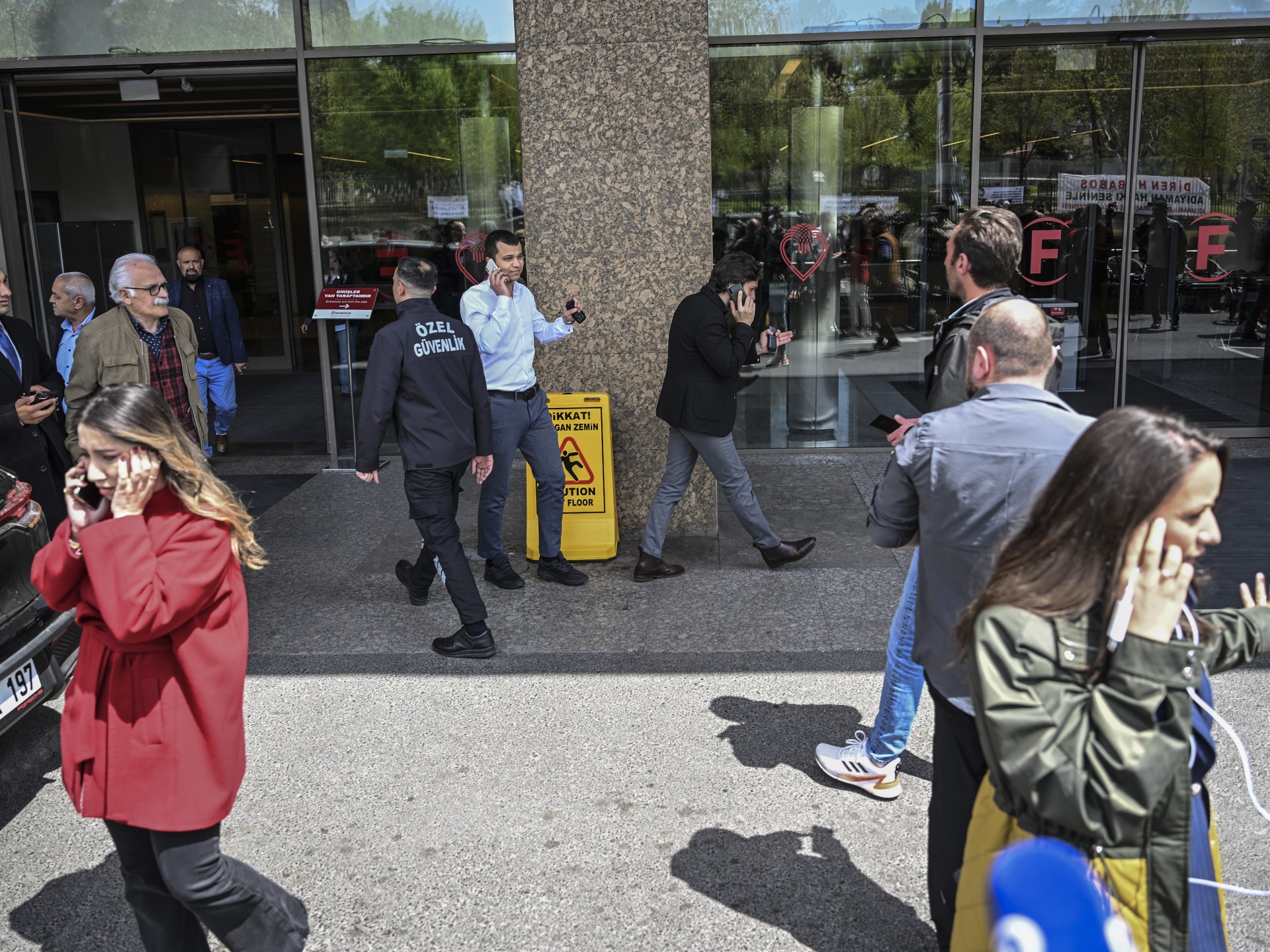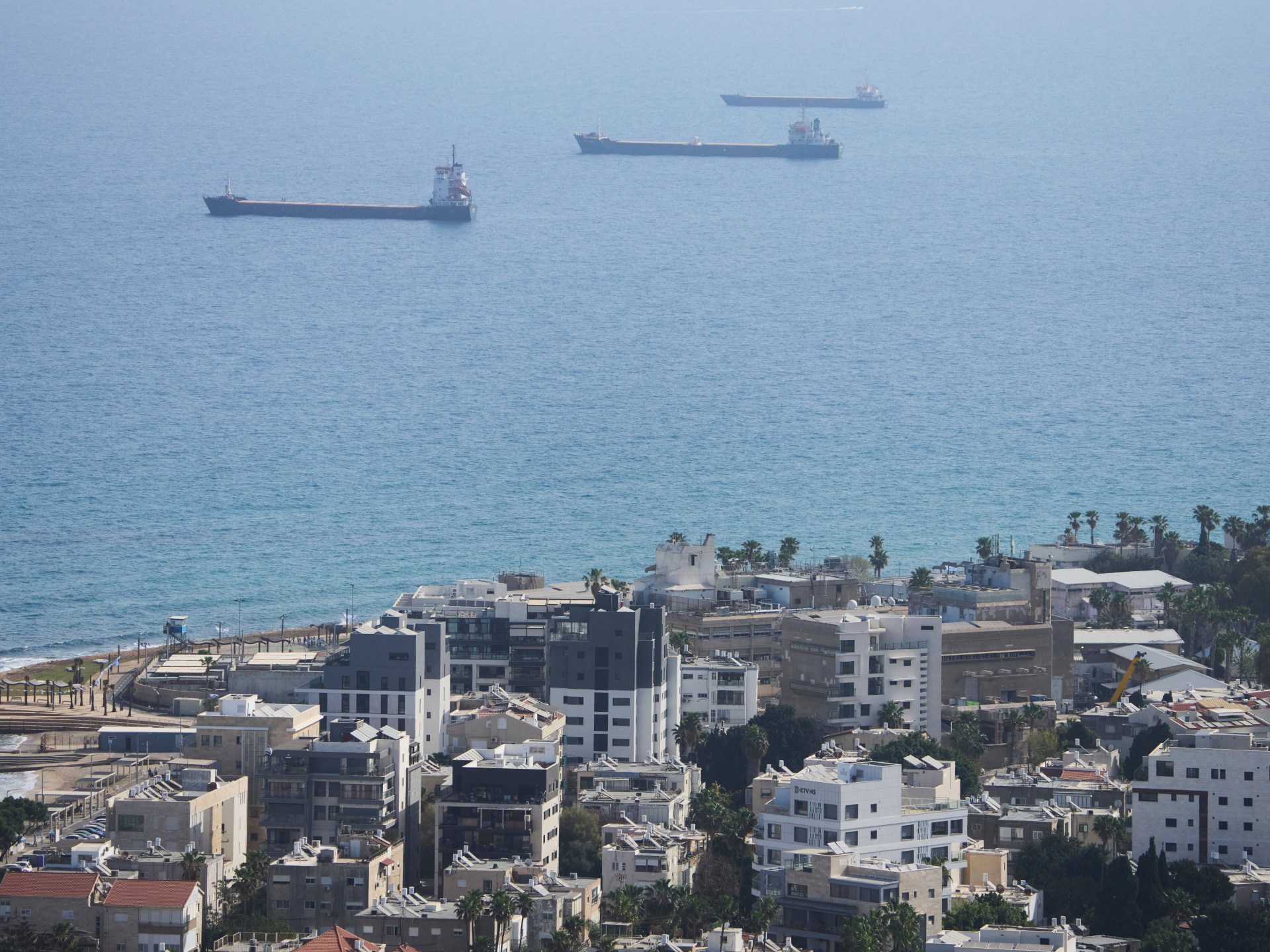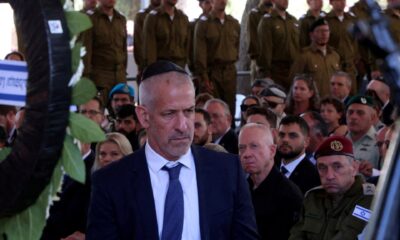Middle East
The Take: US-Iran nuclear talks resume. What’s at stake now? | Nuclear Weapons News

Iran and the United States are holding indirect nuclear talks, mediated by Oman, with the next round set for Saturday. Both sides report progress, but major gaps remain. Iran seeks sanctions relief and civilian uranium enrichment, while the US insists on stricter limits. Could this be the moment the long-stalled negotiations finally produce a breakthrough?
In this episode:
Episode credits:
This episode was produced by Amy Walters, Khaled Soltan, and Tamara Khandaker with Sarí el-Khalili, Phillip Lanos, Spencer Cline, Mariana Navarrete, Kisaa Zehra, Remas Alhawari, Kingwell Ma, Marcos Bartolomé, Manuel Rapalo, and our guest host, Natasha Del Toro. It was edited by Noor Wazwaz.
Our sound designer is Alex Roldan. Our video editors are Hisham Abu Salah and Mohannad Al-Melhem. Alexandra Locke is The Take’s executive producer. Ney Alvarez is Al Jazeera’s head of audio.
Connect with us:
@AJEPodcasts on Instagram, X, Facebook, Threads and YouTube
Middle East
Gaza is burning. UK NGOs must abandon failed diplomacy and fight back | Israel-Palestine conflict

Israel’s Defence Minister Israel Katz declared last week that “no humanitarian aid will enter Gaza”, effectively announcing his government’s intention to continue the collective punishment of the Palestinian enclave’s battered and besieged civilian population in blatant violation of international humanitarian law.
“Blocking this aid is one of the main pressure levers preventing Hamas from using it as a tool with the population,” he went on to say, “No one is currently planning to allow any humanitarian aid into Gaza, and there are no preparations to enable such aid.”
Many leading NGOs and international institutions, such as Amnesty and Human Rights Watch, have long identified Israel’s weaponisation of aid in Gaza as an act of genocide. In response to Katz’s most recent comments, they once again condemned the Israeli government’s genocidal policies and called on Israel’s Western allies to take action to enforce international law.
Such condemnations and calls to action, however, are clearly failing to produce the desired results. After 18 devastating months, Israel is still bombing, shooting at, displacing and starving Palestinians, while openly declaring its intention to continue with these crimes for the foreseeable future. And it is still doing so with the full political, military and diplomatic backing of its Western allies, including Britain.
This is why we believe it is time for British NGOs to change tack.
For the past 18 months, many of us working in the human rights and aid sectors in Britain made repeated requests to our government to do the bare minimum and enforce the basic tenets of international law on its ally, Israel. We campaigned, we lobbied, we engaged, and we explained. We showed the evidence, pointed to the law, and asked our leaders to do the right thing. Our pleas fell on deaf ears. We’ve been met with nothing but indifference.
To this day, Keir Starmer’s government continues to trade with and even sell arms to the Israeli government, despite being aware of the blatant crimes Israel commits day after day in Gaza and in the rest of the occupied Palestinian territories. It still considers Israel a key ally despite knowing that the International Court of Justice (ICJ) is reviewing an allegation of genocide directed at its “war” in Gaza and that there is an International Criminal Court (ICC) arrest warrant out for its prime minister, Benjamin Netanyahu, for various war crimes and crimes against humanity.
Just last week, Britain’s Foreign Secretary David Lammy held talks with Israel’s Foreign Minister Gideon Sa’ar – the top diplomat of a government under investigation for genocide – while he was on an unannounced visit to London. The Foreign Ministry confirmed that Lammy met Sa’ar to “discuss Gaza and other pressing Middle East issues”, during what it described as the Israeli minister’s “private visit to the UK”.
This is unacceptable. British government officials should not be having any public or private meetings with senior ministers from a country accused of the most heinous crimes recognised in international law. They must not be “discussing Gaza and other pressing Middle East issues” with Israeli leaders while Israel continues to bomb refugee tents, kill journalists and medics, and block the delivery of aid to a population under relentless siege.
No politician can claim ignorance of what is happening. Tens of thousands of Palestinians have been killed. Many more have been maimed, traumatised and displaced. Hospitals, clinics, refugee camps, schools, universities, residential neighbourhoods, water and food facilities have been destroyed. Hundreds of aid workers – both local and foreign, including Brits – have been targeted and killed, for the crime of trying to help Palestinians.
The British public at large is horrified by what Israel is doing in the occupied Palestinian territories, and they want it to stop. We have seen this in various opinion polls and on the streets in the form of enormous protests.
And yet, our government is intransigent. The meetings that so many aid and human rights organisations had with ministers and senior civil servants – difficult to get in the first place – have had no impact. Starmer’s government is impervious to all the normal lobbying and campaign tools we employ. It is refusing to hold Israel to account for its blatant violations of international law.
It is time for us to try a different strategy. We cannot continue to engage with the British government as if we are merely having a policy disagreement. This is not a routine case of our government refusing to pay sufficient attention to a conflict or crisis, due to different priorities or conflicting interests. This is not a disagreement we can overcome through engagement and debate. Britain’s leaders today are not only ignoring the most heinous war crimes being livestreamed on our screens on a daily basis, but also insisting on supporting the perpetrators of these crimes – diplomatically, politically and militarily – against warnings and desperate pleas from the human rights sector.
We believe the only way NGOs can actually make a difference in this space is by ending all engagement with the government on this issue. By continuing to talk to the government, we are not helping Palestinians on the ground or our colleagues working with a target on their backs in Gaza. We are merely providing the government with an opportunity to say it is doing something to help those stuck in Israel’s kill zone.
We must not participate in processes and engagements that will be used to whitewash Britain’s complicity in Israel’s crimes.
Rather than trying to talk to a government that has no intention of listening, we should support protests, boycotts and legal efforts to hold Israel’s leaders to account for their role in the genocide. The British government may not be willing to pay attention to our campaigns and reports, but they will eventually pay attention to the ever-growing protests on the streets and the legal decisions against their Israeli allies in British and international courts. At this point in time, continuing a dialogue with the government will only turn us into instruments of British foreign policy.
There is only one way forward. We must loudly name what’s happening in Gaza – a genocide. We should name the crime, underline our government’s complicity in it, and focus our efforts on elevating the voices of our Palestinian colleagues on the ground. Meetings with ministers and civil servants behind closed doors will not make a difference, but informing the public of what is actually happening in Gaza, with support from our government, just may.
We know that our actions cannot magically put an end to the genocide in occupied Palestine, but they can still make a difference. We can add to the pressure on those who have the power to stop the carnage, which is so needed. Additionally, stopping our fruitless engagements with the government will allow us to reorient our work, reconnect with the wider public from whom we should draw our legitimacy and strength, and focus our energy on actions that can make a real difference for people in need.
The actions we, as members of the aid and human rights sector in Britain, take now, do not only matter to those in Gaza. The way our government, our leading institutions and our society at large deal with the genocide in Gaza will set a precedent for how they will deal with crises and emergencies in the future – at home and abroad. It will determine whether our country will be a force that works to uphold human rights and international law, or one that tramples on them whenever convenient. Today, we must all fight for what is right, and show our government that indifference is not acceptable in the face of genocide, lest we ourselves become complicit. History will judge how we respond to this moment.
The views expressed in this article are the authors’ own and do not necessarily reflect Al Jazeera’s editorial stance.
Middle East
Magnitude 6.2 earthquake jolts Turkiye’s Istanbul | News

One person is reportedly injured from jumping off a balcony during the 6.2 magnitude quake.
A strong earthquake has hit Turkiye, causing buildings in the city of Istanbul to shake.
The quake, taking place at 12:49 [09:49 GMT] on Wednesday in the Marmara Sea off the coast of Istanbul’s Silvri area, registered a preliminary 6.2 magnitude, reports Turkiye’s Disaster and Emergency Authority (AFAD).
It was at a depth of 10km (6.21 miles), according to the German Research Centre for Geosciences (GFZ).
The quake was felt in several neighbouring provinces and in the city of Izmir, some 550 kilometres (340 miles) south of Istanbul. The initial quake was followed by eight others with magnitudes of 3.5 to 5.9.
As buildings shook in the city located on the European and Asian shores of the Bosphorus strait, people rushed onto the streets where crowds of worried-looking people stared at their mobile phones for information or made calls, an AFP correspondent said.
“I just felt earthquake, I’ve got to get out,” said a shaken-looking decorator rushing out of a fourth floor apartment where he was working near the city’s Galata Tower, who did not want to give his name.
Turkey’s Interior Minister Ali Yerlikaya told national TV network HaberTurk that authorities had not received reports of collapsed buildings, but that there had been reports of damage to buildings. Transport Minister Abdulkadir Uraloglu said initial inspections did not reveal any damage or adverse conditions on highways, airports, trains or subways.
Broadcaster TGRT reported that one person had been injured as a result of jumping off a balcony during the quake, which occurred during a public holiday in Turkiye, forcing authorities in Istanbul to cancel scheduled events.
Kemal Cebi, the mayor of Kucukcekmece district in western Istanbul, told local broadcaster NTV that there were “no negative developments yet”, but said that there were traffic jams and that many buildings were already at risk due to the density of the area.
In a post on X, Yerlikaya said emergency authorities have begun “field assessments” and offered well wishes to those affected.
AFAD warned people in the region against entering damaged buildings.
The tremors could be felt as far away as Bulgaria, according to the AFP news agency in the capital Sofia.
President Tayyip Erdogan said on X he was monitoring the situation and his office issued advice on what people should do in the case of further quakes.
Previous deadly quake
Turkey is crossed by two significant fault lines, and earthquakes are frequent.
The last tremor to be felt in Istanbul was in mid-November, when a quake caused brief panic but no damage or injuries.
A magnitude 7.8 earthquake on February 6, 2023, and a second powerful tremor that came hours later, destroyed or damaged hundreds of thousands of buildings in 11 southern and southeastern Turkish provinces, leaving more than 53,000 people dead.
Another 6,000 people were killed in the northern parts of neighbouring Syria.
While Istanbul was not impacted by that earthquake, the devastation heightened fears of a similar quake with experts citing the city’s proximity to fault lines.
In a bid to prevent damage from any future quake, both the national government and local administrations started urban reconstruction projects to fortify buildings at risk and started campaigns of demolishing buildings at risk of collapse.
Middle East
Yemen’s Houthis launch rare missile attack on northern Israel | Conflict News

Israel says the ballistic missile has been intercepted without causing any injuries.
Yemen’s Houthi rebels have launched a ballistic missile towards northern Israel, according to the Israeli military, which claimed to have shot down the projectile without causing any injuries.
Shortly after 4am local time (01:00 GMT) on Wednesday, the Israeli army said that the missile triggered air raid sirens in Haifa, Krayot and other areas west of the Sea of Galilee.
This area is a rare target for the Iran-backed Houthi rebels, who continue to be the target of an intense United States air strike campaign.
Since the war in Gaza broke out in October 2023, the Houthis have repeatedly fired missiles and drones at Israel in what they say is a show of solidarity with the Palestinians.
The rebel group controls swaths of Yemen, and Israel has struck Houthi targets several times inside the country, including in the capital, Sanaa.
The Houthis claimed responsibility for the attack several hours later, with military spokesman Yahya Saree saying the group had carried out the attack on “a vital Zionist enemy target in the occupied area of Haifa”.
“The missile reached its target… and interception systems failed to intercept it, causing fear and panic,” he added.
US attacks
Meanwhile, US air strikes, part of an almost daily campaign that began on March 15, continued targeting the Houthis on Wednesday morning. The Houthis reported US strikes on the Hodeidah, Marib and Saada governorates.
In Marib, the Houthis described a strike hitting telecommunications equipment, which had previously been a US target.
The Houthis, in response, have stepped up their targeting of US drones flying over the country. Houthi military spokesman Brigadier General Yahya Saree said late on Tuesday that the rebels had shot down an MQ-9 Reaper drone over Yemen’s northwest Hajjah governorate.
MQ-9 Reaper drones, which cost about $30m apiece, can fly at altitudes of more than 40,000 feet (12,100 metres) and remain in the air for more than 30 hours.
The US military and CIA have flown them for years over Afghanistan, Iraq, and now Yemen.
The Houthis claim to have downed 26 MQ-9s over the past decade of the Yemen war.
The US military acknowledged the report of the drone being downed but said it could not comment further.
The US military says it is targeting Houthi “terrorists” to stop attacks on international shipping in the Red Sea, a crucial global trade route, and Israel.
-

 Europe1 day ago
Europe1 day agoSimone Biles, Mondo Duplantis win big at 25th Laureus World Sports Awards
-

 Sports2 days ago
Sports2 days agoShannon Sharpe: Pro Football Hall of Famer and podcast star sued for sexual assault and battery
-

 Middle East1 day ago
Middle East1 day agoIsraeli spy chief accuses Netanyahu of demanding illegal operations | Politics News
-

 Sports2 days ago
Sports2 days agoSharon Lokedi smashes women’s course record at the Boston Marathon, John Korir wins men’s race
-

 Europe2 days ago
Europe2 days agoCardinal Kevin Farrell: Meet the ‘camerlengo’ running the Vatican
-

 Education2 days ago
Education2 days agoInvoluntary collection of defaulted student loans to resume, Education Department says
-

 Africa2 days ago
Africa2 days agoKenyan runners win both male and female races at Boston Marathon 2025
-

 Middle East2 days ago
Middle East2 days agoMore than 30 killed in latest attack in Sudan’s Darfur region: Monitor | Sudan war News




